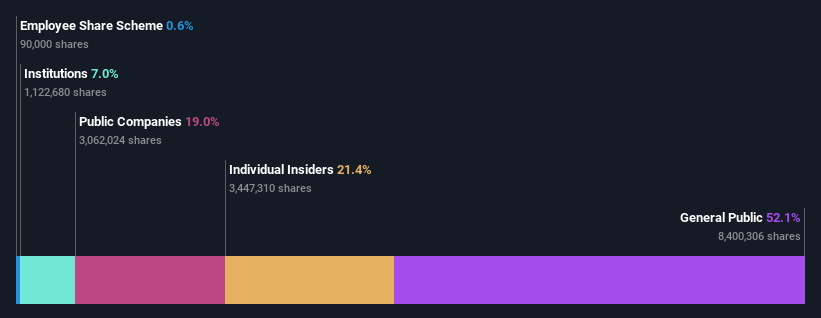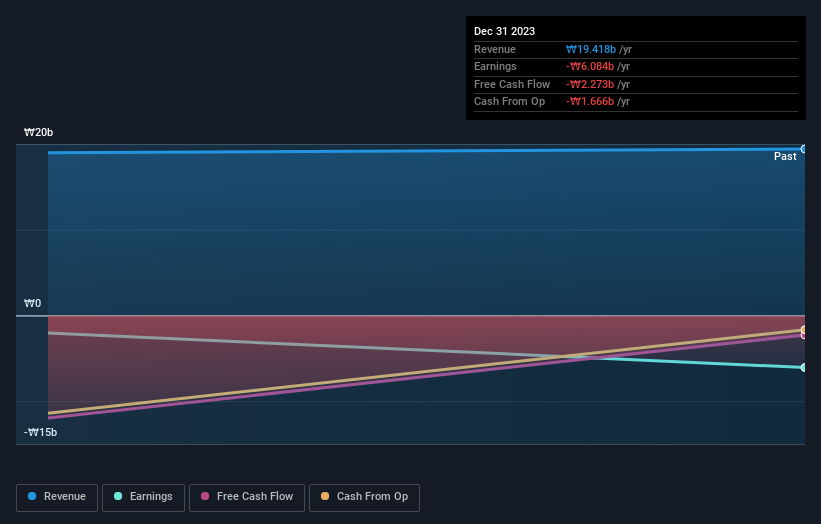Stock Analysis
- South Korea
- /
- Entertainment
- /
- KOSDAQ:A432430
Retail investors invested in YLAB Corporation (KOSDAQ:432430) copped the brunt of last week's ₩27b market cap decline

Key Insights
- YLAB's significant retail investors ownership suggests that the key decisions are influenced by shareholders from the larger public
- 48% of the business is held by the top 13 shareholders
- Insiders own 21% of YLAB
A look at the shareholders of YLAB Corporation (KOSDAQ:432430) can tell us which group is most powerful. We can see that retail investors own the lion's share in the company with 52% ownership. That is, the group stands to benefit the most if the stock rises (or lose the most if there is a downturn).
While insiders who own 21% came under pressure after market cap dropped to ₩190b last week,retail investors took the most losses.
Let's delve deeper into each type of owner of YLAB, beginning with the chart below.
View our latest analysis for YLAB

What Does The Institutional Ownership Tell Us About YLAB?
Institutions typically measure themselves against a benchmark when reporting to their own investors, so they often become more enthusiastic about a stock once it's included in a major index. We would expect most companies to have some institutions on the register, especially if they are growing.
We can see that YLAB does have institutional investors; and they hold a good portion of the company's stock. This suggests some credibility amongst professional investors. But we can't rely on that fact alone since institutions make bad investments sometimes, just like everyone does. When multiple institutions own a stock, there's always a risk that they are in a 'crowded trade'. When such a trade goes wrong, multiple parties may compete to sell stock fast. This risk is higher in a company without a history of growth. You can see YLAB's historic earnings and revenue below, but keep in mind there's always more to the story.

Hedge funds don't have many shares in YLAB. Inwan Yoon is currently the company's largest shareholder with 17% of shares outstanding. The second and third largest shareholders are NAVER Corporation and CJ ENM CO., Ltd., with an equal amount of shares to their name at 9.5%.
A deeper look at our ownership data shows that the top 13 shareholders collectively hold less than half of the register, suggesting a large group of small holders where no single shareholder has a majority.
While it makes sense to study institutional ownership data for a company, it also makes sense to study analyst sentiments to know which way the wind is blowing. Our information suggests that there isn't any analyst coverage of the stock, so it is probably little known.
Insider Ownership Of YLAB
The definition of an insider can differ slightly between different countries, but members of the board of directors always count. Company management run the business, but the CEO will answer to the board, even if he or she is a member of it.
Most consider insider ownership a positive because it can indicate the board is well aligned with other shareholders. However, on some occasions too much power is concentrated within this group.
It seems insiders own a significant proportion of YLAB Corporation. Insiders own ₩41b worth of shares in the ₩190b company. This may suggest that the founders still own a lot of shares. You can click here to see if they have been buying or selling.
General Public Ownership
The general public, mostly comprising of individual investors, collectively holds 52% of YLAB shares. This size of ownership gives investors from the general public some collective power. They can and probably do influence decisions on executive compensation, dividend policies and proposed business acquisitions.
Public Company Ownership
Public companies currently own 19% of YLAB stock. We can't be certain but it is quite possible this is a strategic stake. The businesses may be similar, or work together.
Next Steps:
It's always worth thinking about the different groups who own shares in a company. But to understand YLAB better, we need to consider many other factors. For instance, we've identified 2 warning signs for YLAB (1 doesn't sit too well with us) that you should be aware of.
Of course this may not be the best stock to buy. So take a peek at this free free list of interesting companies.
NB: Figures in this article are calculated using data from the last twelve months, which refer to the 12-month period ending on the last date of the month the financial statement is dated. This may not be consistent with full year annual report figures.
Valuation is complex, but we're helping make it simple.
Find out whether YLAB is potentially over or undervalued by checking out our comprehensive analysis, which includes fair value estimates, risks and warnings, dividends, insider transactions and financial health.
View the Free AnalysisHave feedback on this article? Concerned about the content? Get in touch with us directly. Alternatively, email editorial-team (at) simplywallst.com.
This article by Simply Wall St is general in nature. We provide commentary based on historical data and analyst forecasts only using an unbiased methodology and our articles are not intended to be financial advice. It does not constitute a recommendation to buy or sell any stock, and does not take account of your objectives, or your financial situation. We aim to bring you long-term focused analysis driven by fundamental data. Note that our analysis may not factor in the latest price-sensitive company announcements or qualitative material. Simply Wall St has no position in any stocks mentioned.
About KOSDAQ:A432430
YLAB
Engages in the planning, development, production, and publishing of video contents based on webtoons and webnovel IPs.
Flawless balance sheet with weak fundamentals.


